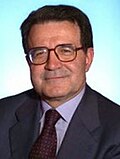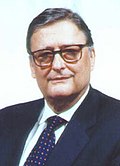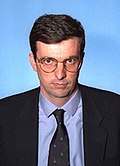| Portrait | Office | Name | Term | Party | Undersecretaries |
|---|
 | Prime Minister | Romano Prodi | 18 May 1996 – 21 October 1998 | | Independent | Enrico Luigi Micheli (PPI)
Arturo Parisi (Ind.) [a]
Giorgio Bogi (SR)
(until 14 March 1997) |
|
|---|
 | Deputy Prime Minister | Walter Veltroni | 18 May 1996 – 21 October 1998 | | Democratic Party of the Left |
|
|---|
 | Minister of Foreign Affairs | Lamberto Dini | 18 May 1996 – 21 October 1998 | | Italian Renewal | Piero Fassino (PDS)
Rino Serri (MCU)
Patrizia Toia (PPI) |
 | Minister of the Interior | Giorgio Napolitano | 18 May 1996 – 21 October 1998 | | Democratic Party of the Left | Franco Barberi (Ind.)
Fabrizio Abbate (PPI)
Giannicola Sinisi (PPI)
Adriana Vigneri (PDS)
Lucio Testa (RI)
Angelo Giorgianni (RI)
(until 13 March 1998) |
 | Minister of Grace and Justice | Giovanni Maria Flick | 18 May 1996 – 21 October 1998 | | Independent | Giuseppe Ayala (UD)
Franco Corleone (FdV)
Antonino Mirone (Patto) |
 | Minister of Treasury, Budget and Economic Planning | Carlo Azeglio Ciampi | 18 May 1996 – 21 October 1998 | | Independent | Laura Pennacchi (PDS)
Giorgio Macciotta (PDS)
Isaia Sales (PDS)
Roberto Pinza (PPI)
Filippo Cavazzuti (PDS)
Dino Piero Giarda (Ind.) |
 | Minister of Finance | Vincenzo Visco | 18 May 1996 – 21 October 1998 | | Democratic Party of the Left | Giovanni Marongiu (RI)
Fausto Vigevani (PDS)
Pierluigi Castellani (PPI)
(since 21 Nov. 1996) |
 | Minister of Defence | Beniamino Andreatta | 18 May 1996 – 21 October 1998 | | Italian People's Party | Massimo Brutti (PPI)
Gianni Rivera (Patto) |
 | Minister of Education, University, Scientific and Technological Research | Luigi Berlinguer | 18 May 1996 – 21 October 1998 | | Democratic Party of the Left | Nadia Masini (PDS)
Carla Rocchi (FdV)
Albertina Soliani (PPI) |
 | Minister of Public Works | Antonio Di Pietro | 18 May 1996 – 20 November 1996 | | Independent | Antonio Bargone (PDS)
Gianni Francesco Mattioli (FdV) |
 | Paolo Costa | 20 November 1996 – 21 October 1998 | | Independent |
 | Minister of Agricultural Resources | Michele Pinto | 18 May 1996 – 21 October 1998 | | Italian People's Party | Roberto Borroni (PDS) |
 | Minister of Transport and Navigation | Claudio Burlando | 18 May 1996 – 21 October 1998 | | Democratic Party of the Left | Giuseppe Albertini (PDS)
Giuseppe Soriero (PDS) |
 | Minister of Post and Telecommunications | Antonio Maccanico | 18 May 1996 – 21 October 1998 | | Democratic Union | Vincenzo Maria Vita (PDS)
Michele Lauria (PPI) |
 | Minister of Industry, Commerce and Craftsmanship | Pier Luigi Bersani | 18 May 1996 – 21 October 1998 | | Democratic Party of the Left | Umberto Carpi (PDS)
Salvatore Ladu (PPI) |
 | Minister of Labour and Social Security | Tiziano Treu | 18 May 1996 – 21 October 1998 | | Italian Renewal | Antonio Pizzinato (PDS)
Federica Gasparrini (RI)
Elena Montecchi (PDS)
(until 23 Feb. 1998)
Alessandro Garilli (Ind.)
(since 20 March 1998) |
 | Minister of Foreign Trade | Augusto Fantozzi | 18 May 1996 – 21 October 1998 | | Italian Renewal | Antonello Cabras (UD) |
 | Minister of Health | Rosy Bindi | 18 May 1996 – 21 October 1998 | | Italian People's Party | Bruno Viserta Costantini (PDS)
Monica Bettoni Brandani (PDS) |
 | Minister of Cultural Heritage and Activities | Walter Veltroni | 18 May 1996 – 21 October 1998 | | Democratic Party of the Left | Willer Bordon (AD)
Alberto La Volpe (SI) |
 | Minister of the Environment | Edo Ronchi | 18 May 1996 – 21 October 1998 | | Federation of the Greens | Valerio Calzolaio (PDS) |
|
|---|
 | Minister of Public Function and Regional Affairs
(without portfolio) | Franco Bassanini | 18 May 1996 – 21 October 1998 | | Democratic Party of the Left | Sergio Zoppi (PPI)
Ernesto Bettinelli (Ind.)
(since 13 Feb. 1997) |
 | Minister for Parliamentary Relations
(without portfolio) | Giorgio Bogi | 14 March 1997 – 21 October 1998 | | Republican Left | Elena Montecchi (PDS)
(since 23 Feb. 1998) |
 | Minister for Equal Opportunities
(without portfolio) | Anna Finocchiaro | 18 May 1996 – 21 October 1998 | | Democratic Party of the Left | |
 | Minister of Social Solidarity
(without portfolio) | Livia Turco | 18 May 1996 – 21 October 1998 | | Democratic Party of the Left | |
























